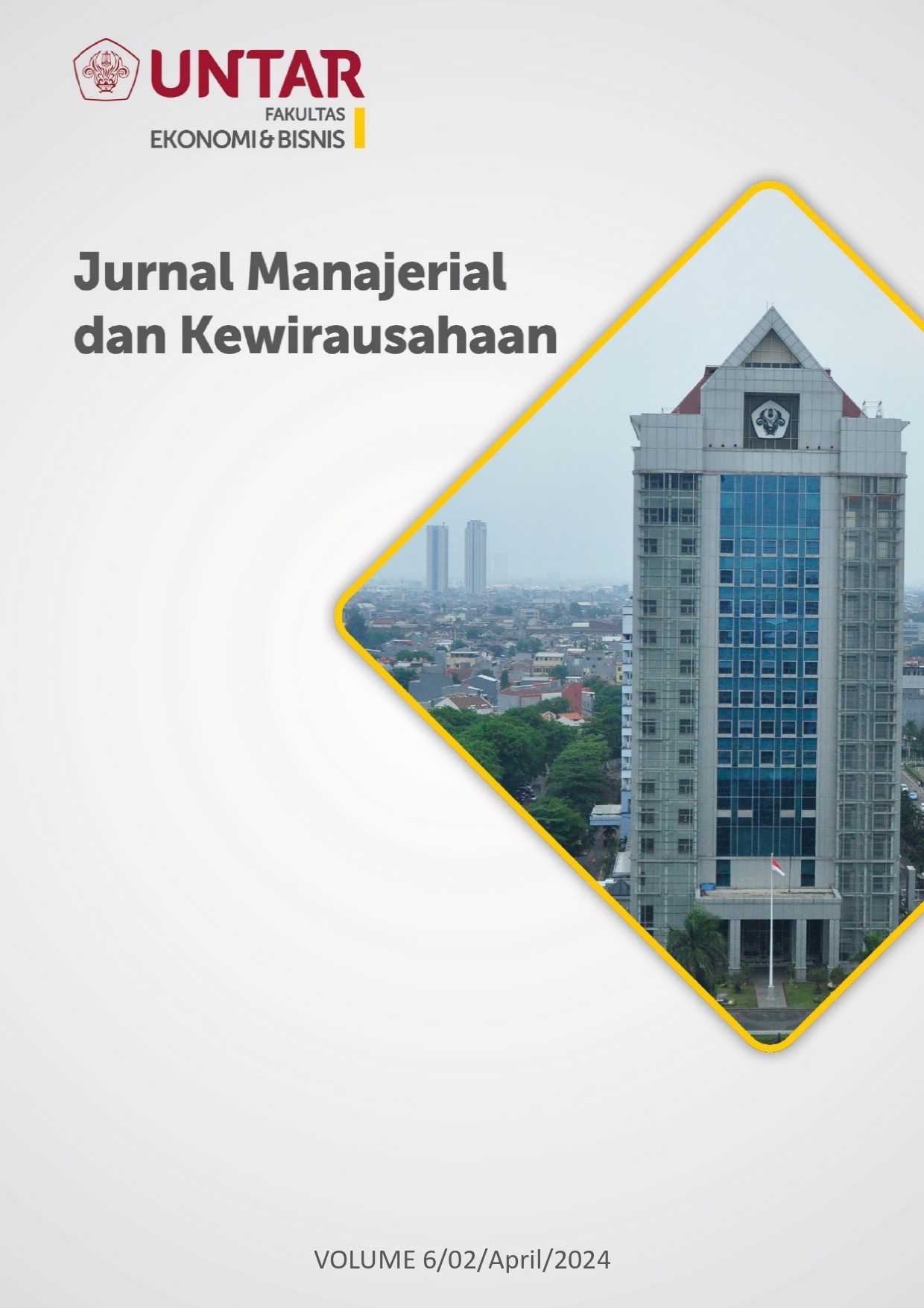Peran Trust dalam Memediasi E-WOM terhadap Purchase Intention
Main Article Content
Abstract
Technology in Indonesia has experienced rapid and significant growth, particularly in sectors such as telecommunications, information technology, and e-commerce. The marketplace serves as a prominent online platform where sellers and buyers converge to interact and conduct transactions, exchanging products and services. Lazada, as one of the leading marketplace platforms in Indonesia, plays a central role in the e-commerce landscape. This research employs the TPB and utilizes a descriptive cross-sectional design, as data collection occurs at a single point in time from a sample drawn from the population of customers who have made purchase on Lazada in Jakarta.The nonprobability sampling method used is purposive sampling, selecting participants based on the criterion of being 18 years and above, aligning with the adolescent age group. The sample size consists of 203 respondents. Primary data is collected through a questionnaire distributed via Google Forms and shared on platforms like WhatsApp. The data is analyzed using Smart PLS-SEM version 4.0.The results reveal a significant relationship between electronic word of mouth (e-wpm), brand trust, and purchase intention. The analysis indicates that brand trust acts as a mediating variable with a significant impact on the relationship between all variables and purchase intention.
Article Details
Section

This work is licensed under a Creative Commons Attribution-NonCommercial-ShareAlike 4.0 International License.
This work is licensed under a Jurnal Muara Ilmu Ekonomi dan Bisnis Creative Commons Attribution-ShareAlike 4.0 International License.,/p>
References
Ajzen, I. (1991). The Theory of Planned Behavior. Organizational Behavior and Human Decision Processes, 50(2), 179-211. https://doi.org/10.1016/0749-5978(91)90020-T
Bansal, H. S. & Voyer, P. A. (2000). Word-of-Mouth Processes within A Services Purchase Decision Context. Journal of Service Research, 3(2), 166-177. https://doi.org/10.1177/109467050032005
Budiman, J. & Hartoko, R. (2022). Analisis Pengaruh Brand Image, Brand Awareness, E-Wom dengan Trust sebagai Variabel Mediasi terhadap Purchase Intention Skincare Korea di Kota Batam. Jurnal Ilmiah Mahasiswa Ekonomi Manajemen, 4(3), 589–603. https://doi.org/10.24815/jimen.v7i3.21201
Cheung, C. M. K., Lee, M. K. O., & Rabjohn, N. (2008). The impact of electronic word-of-mouth: The adoption of online opinions in online customer communities. Internet Research, 18(3), 229–247. https://doi.org/10.1108/10662240810883290
Chinomona, R. (2016). Brand communication, brand image and brand trust as antecedents of brand loyalty in gauteng province of south Africa. African Journal of Economic and Management Studies, 7(3), 290–294. https://doi.org/10.1108/AJEMS-06-2016-0088
Ellitan, L., De Rosari, A., & Kristanti, M. M. (2022). Analisis pengaruh instagram terhadap niat pembelian melalui brand awareness dan brand trust pada starbucks surabaya. Jurnal Ilmiah Akuntansi dan Keuangan, 4(10), 4740-4748.
Farzin, M., & Fattahi, M. (2018). E-wom through social networking sites and impact on purchase intention and brand image in Iran. Journal of Advances in Management Research, 15(2), 161–183. https://doi.org/10.1108/JAMR-05-2017-0062
Fatmawati & Zainab. (2020). Pengaruh kualitas pelayanan dan kepercayaan terhadap kepuasan anggota Koperasi Keluarga Karunia Sejahtera (K3S) Gresik. JEK - Jurnal Ekonomi Dan Kewirausahaan Kreatif, 2(60), 93–102.
Fitriana, D., & Yulianti, I. (2013). Pengaruh brand image terhadap purchase intention. Brawijaya Knowledge Garden, (2), 51–64. https://jimfeb.ub.ac.id/index.php/jimfeb/article/view/1100/1011
Fournier, S. (1998). Consumers and their brands: developing relationship theory in consumer research. Journal of Consumer Research, 24(4), 343–373. https://doi.org/10.1086/209515
Hair, J. F., Hult, G. T. M., Ringle, C. M., Sarstedt, M., Danks, N. P., & Ray, S. (2021). Partial Least Squares Structural Equation Modeling (PLS-SEM) Using. In Practical Assessment, Research and Evaluation, 21(1).
Hennig-Thurau, T., Gwinner, K. P., Walsh, G., & Gremler, D. D. (2004). Electronic word-of-mouth via consumer-opinion platforms: what motivates consumers to articulate themselves on the internet? Journal of Interactive Marketing, 18(1), 38–52. https://doi.org/10.1002/dir.10073
Jasin, H., Mujiatun, S., Rambe, M. F., & Siregar, R. B. (2021). Apakah kepercayaan memediasi pengaruh reputasi bank dan religiusitas terhadap purchase intention? Jurnal Ilmiah Manajemen Dan Bisnis, 22(1), 86-102.
Kurnia, U. D., & Wenti, K. (2023). Pengaruh brand image, brand trust dan electronic word of mouth terhadap pembelian Erigo di kabupaten Gresik oleh generasi Z. Jurnal Manajemen Dan Bisnis Terapan, 3(1), 1–11.
Lee, J., & Lee, Y. (2018). Effects of multi-brand company’s CSR activities on purchase intention through a mediating role of corporate image and brand image. Journal of Fashion Marketing and Management, 22(3), 387–403. https://doi.org/10.1108/JFMM-08-2017-0087
Malhotra, N . K. (2020). Essentials of marketing Research. Pearson Education Limited.
Mayer, R. C., Davis, J. H., & Schoorman, F. (1995) An integrative model of organizational trust. Academy of Management Review, 20(3), 709–734.
Munir, M., & Darmawan, D. (2022). The role of trust, ease of use and security on shopping interests at Lazada. Engineering and Technology International Journal, 4(3), 135-145.
Rahman, M. A., Abir, T., Yazdani, D. M. N., Hamid, A. B. A., & Mamun, A. A. (2020). Brand Image, Ewom, Trust and Online Purchase Intention of Digital Products among Malaysian Consumers. Journal Of Xi’an University of Architecture & Technology, 12(3). https://doi.org/10.37896/jxat12.03/452
Ring, P. S., & Ven de Van, A. H. (1992). Structuring cooperative relationships between organizations. Strategic Management Journal, 13(7), 483–498. https://doi.org/10.1002/smj.4250130702
Saputra, D. (2021). Pengaruh brand image, trust, perceived price, dan ewom terhadap purchase intention smartphone di Jakarta. Jurnal Manajemen Bisnis Dan Kewirausahaan, 5(5), 512. https://doi.org/10.24912/jmbk.v5i5.13302
Shula, P. (2010). Impact of interpersonal influences, brand origin and brand image on luxury purchase intentions: Measuring interfunctional interactions and a cross-national comparison. Journal of World Business, 46(2), 242–252. https://doi.org/10.1016/j.jwb.2010.11.002
Sulthana, A. N., & Vasantha, S. (2019). Influence of electronic word of mouth ewom on purchase intention. International Journal of Scientific and Technology Research, 8(10), 1–5.
Veronica, V. & Rodhiah, R. (2021). Pengaruh Privacy, Social Influence terhadap Online Purchase Intention: Trust sebagai Variabel Mediasi. Jurnal Muara Ilmu Ekonomi dan Bisnis, 5(2), 235-246. https://doi.org/10.24912/jmieb.v5i2.9657
Wang, S. W., Ngamsiriudom, W., & Hsieh, C. H. (2015). Trust disposition, trust antecedents, trust, and behavioral intention. The Service Industries Journal, 35(10), 555-572.
Yohanna, Y. & Ruslim, T. S. (2021). Pengaruh Brand Love, Brand Satisfaction, Brand Trust terhadap Niat Pembelian Produk Gucci. Jurnal Manajerial dan Kewirausahaan, 3(2), 569-579. https://doi.org/10.24912/jmk.v3i2.11903

